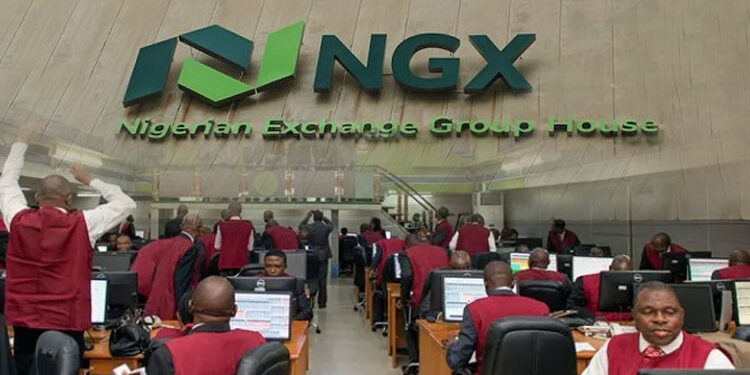Nigeria’s equities market opened the new month in the negative on Thursday, recording the highest daily decline in the protest week.
For the fourth consecutive day, the market decreased by 0.42 percent at the close of the trading session.
This is as aggrieved Nigerian youths on Thursday, August 1 took to the streets across major cities of Africa’s most populous nation in line with their planned 10-day protest against bad governance and hunger.
Also, Investors on the Nigerian equities market shed N1.088 trillion in the month of July, 2024 on continuous sell off by investors.
Opened the new month on decline with N236 billion loss, indicating subdued investors participation and a lack of significant market movement.
The All-Share Index (ASI) lost 414.46 points, representing a loss of 0.42 per cent to close at 97,359.76 points. Also, market capitalisation declined by N236 billion to close at N55.278 trillion.
The downturn was driven by price depreciation in large and medium capitalised stocks amongst which are; MTN Nigeria Communications (MTNN), Dangote Sugar Refinery, Oando, Guinness Nigeria and MeCure Industries.
MeCure Industries led others on the losers’ chart with 9.94 per cent to close at N8.15, per share. Thomas Wyatt Nigeria followed with a decline of 9.74 per cent to close at N1.76, while Wapic Insurance shed 8.24 per cent to close at 78 kobo, per share.
Oando lost 8.00 per cent to close at N23.00, while Dangote Sugar Refinery shed 7.67 per cent to close at N34.30, per share.
On the monthly activities, July was eventful, marked by mixed sentiment and corporate earnings, capital raising of Banks, and the windfall tax on banks’ foreign exchange profits in 2023. Fidelity Bank, Access Holdings, Guaranty Trust Holding Company and FCMB Groups are currently embarking on their capitalisation exercise.
The market capitalisation lost N1.088 trillion from N56.602 trillion at the beginning of the month of July to close at N55.514 trillion at the end of the month. Similarly, the Nigerian Exchange (NGX) Limited All-Share Index (ASI) declined by 2.28 per cent to close on July 31, 2024 at 97,774.22 points from 100,057.49 points at the beginning of the month.
Speaking on market performance in July, market analysts stated that market activity has been characterised with ongoing banks’ recapitalisation efforts, Q2 filings, and anticipated corporate actions in the near term.
They also noted that the elevated interest rates in the fixed income market have negatively influenced equities as investors capitalise on higher fixed income yields.
Managing director/chief executive officer of APT Securities and Funds Limited, Garba Kurfi said that the market witnessed Banks’ offers and quite a number of them have lost their momentum, as investors are selling their stake in the selling market to take up their rights in Banks’ offer.
He also noted that big capitalised stocks like Dangote Cement and MTN Nigeria Communications declined in the period under review, saying that these two stocks due to their high capitalisation have an impact on the market overall performance.
A senior stockbroker, Tunde Oyediran explained that the loss seen in the month of July is basically the way investors responded to some of the policies of the government and the Central Bank of Nigeria (CBN) on the windfall tax on banks’ foreign exchange profits, this also coupled with the fact that the interest rate is getting high and investors prefer to invest in where they are sure of higher returns.
The CEO, Wyoming Capital and Partners, Tajudeen Olayinka, said the stock market is now in a repricing mode because of interest rate hike and continued issuances of one-year Treasury bills at high effective yield of over 20 per cent. So, we are witnessing a shift to the fixed income market.
The managing director, ARM Securities Limited, Rotimi Olubi said the high fixed-income yield is driving traction from the equities market to the fixed-income market.
The chief operating officer of InvestData Consulting Limited, Ambrose Omordion said the market closed negative in July in the face of mixed sentiment and corporate earnings, with more scorecards being released to the market ahead of the regulatory deadline for submission of quarterly financials by listed companies, saying that market players has continued to digest the numbers made available in the midst of weak macroeconomic data, a reflection of the mismatch of economic policies.
Omordion emphasised that the ongoing earnings reporting season is likely to support market fundamentals in the midst of sector rotation, portfolio rebalancing and ongoing primary market activities of the Banks that have dominated the market even while consumers and investor confidence is slowing down.
He also noted that private sector businesses are closing down amid economic challenges and over-regulation.





